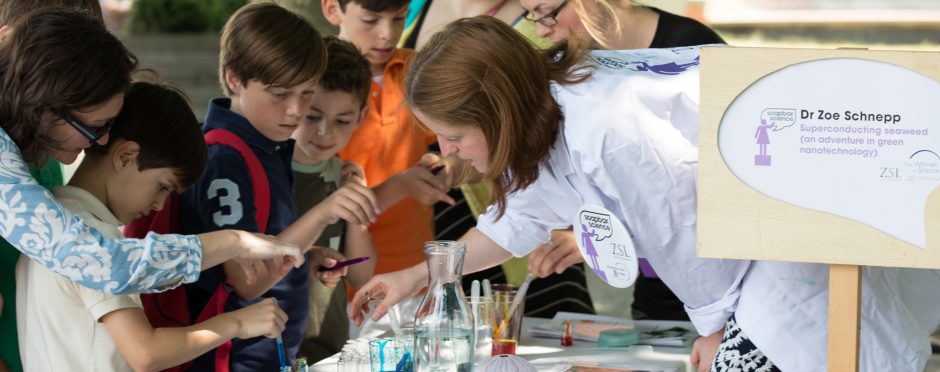 Having volunteered at Soapbox Science Brighton in 2017, Tochukwu is now taking part as a speaker! Currently in her third year of PhD study, Tochukwu’s research is focused on developing nanomaterial-based strategies for biomedical therapies. She will be speaking at Soapbox Science Brighton on 2nd June 11am-2pm with her talk “How do nanomaterials remove contaminants?”
Having volunteered at Soapbox Science Brighton in 2017, Tochukwu is now taking part as a speaker! Currently in her third year of PhD study, Tochukwu’s research is focused on developing nanomaterial-based strategies for biomedical therapies. She will be speaking at Soapbox Science Brighton on 2nd June 11am-2pm with her talk “How do nanomaterials remove contaminants?”
The University of Brighton is sponsoring Tochukwu’s talk.
SS: What attracted you to Soapbox Science in the first place – and what are you most looking forward to/excited about in taking part?
TO: I love the unique approach Soapbox Science is using to change gender stereotypes about women in science. I volunteered at last year’s event and was instantly hooked. As researchers, we are often caught up in our little ‘science’ bubbles and forget that there is a world out there that needs to know what we are doing. I am looking forward to talking science with the beautiful people of Brighton. That should be fun!
SS: Tell us about your career pathway
TO: After my undergraduate degree in Biochemistry, I worked as a Teaching Assistant in the University of Nigeria, Nsukka for 2.5 years during which I studied for a Master’s degree. I knew I had to do a PhD to further improve my research and technical skills so I applied for scholarships. Fortunately, I secured a studentship at the University of Brighton to work on a multi-disciplinary project with a very supportive supervisor, Dr Susan Sandeman. Over the course of the PhD, I have mastered key techniques across different fields, presented my research at conferences and collaborated with researchers at another university. These experiences have broadened my knowledge, thinking and skill set which are valuable for an academic career.
SS: What, or who, inspired you to get a career in science?
TO: Growing up, I excelled in science subjects and so this felt natural for me. I love science because there is always a reason why. Nothing happens without a cause.
SS: What is the most fascinating aspect of your research/work?
TO: Nanoscience is a relatively new field and we are just beginning to uncover its huge potential particularly with respect to biological applications. My research is focused on understanding how nanomaterials can be used to disrupt infection and inflammation in the body. The most fascinating aspect for me is in ‘connecting the dots’ – understanding how the properties of the nanomaterials help them remove biotoxins and influence their interactions with cells and microorganisms.
SS: Research in STEM is increasingly multi-disciplinary. Which subjects do you use in your work?
TO: I mostly use Science, particularly Chemistry and Biology. I also use Maths for calculations and Statistics to understand the significance of my results.
SS: What 3 attributes do you consider important to your work (e.g. creativity, team-work, etc), and why did you pick these?
TO: Even though you may be part of a larger group, a PhD requires that you undertake independent research. The key attributes important to me are
- Commitment – A PhD is not a walk in the park and sometimes, I have to remind myself that this is what I signed up for. That there is a purpose to it all – the sleepy eyes, failed experiments and tonnes of hard work. This keeps me going on the toughest days.
- Sense of responsibility – This keeps me focused and helps me work with the required precision and accuracy. Since I am invested in the project, I am willing to trouble shoot, seek assistance and try new things.
- Integrity – The work that I do is an extension of who I am and so I have to do things with an excellent spirit. As a researcher, there is a certain level of trust accorded to me and I do not take that for granted.
SS: If you could change one thing about the scientific culture right now, what would it be?
TO: Short-term contracts. That way, we won’t see highly skilled researchers leave academia against their will.
SS: What would be your top recommendation to a female student considering pursuing a career in academia?
TO: Do not be afraid to go for what you want. Put yourself out there. Sign up for whatever you can, especially during your PhD. It is also important to find mentors who are genuinely interested in your progress. You learn from their mistakes and they keep you accountable. Having a support network is equally important but also remember there are some journeys you may have to travel alone.
SS: What words of encouragement would you give to children who might be interested in a career in science?
TO: Science is really interesting because it helps us find answers to the questions that surround us. Don’t be afraid to keep learning, exploring and challenging yourself. Refuse to be swayed by other people’s opinions.
